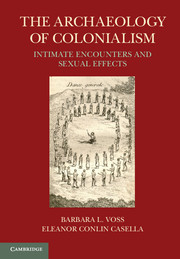Book contents
- Frontmatter
- Contents
- List of Illustrations
- List of Tables
- List of Contributors
- One Intimate Encounters
- Two Sexual Effects
- Section I Pleasures and Prohibitions
- Section II Engaged Bodies
- Seven Fear, Desire, and Material Strategies in Colonial Louisiana
- Eight Death and Sex
- Nine Effects of Empire
- Ten In-between People in Colonial Honduras
- Eleven The Scale of The Intimate
- Section III Commemorations
- Section IV Showing and Telling
- Conclusion
- Index
- References
Nine - Effects of Empire
Gendered Transformations on the Orinoco Frontier
from Section II - Engaged Bodies
Published online by Cambridge University Press: 05 June 2012
- Frontmatter
- Contents
- List of Illustrations
- List of Tables
- List of Contributors
- One Intimate Encounters
- Two Sexual Effects
- Section I Pleasures and Prohibitions
- Section II Engaged Bodies
- Seven Fear, Desire, and Material Strategies in Colonial Louisiana
- Eight Death and Sex
- Nine Effects of Empire
- Ten In-between People in Colonial Honduras
- Eleven The Scale of The Intimate
- Section III Commemorations
- Section IV Showing and Telling
- Conclusion
- Index
- References
Summary
Between the fifteenth and eighteenth centuries, several European nations vied for a foothold in the Antilles and the Eastern Coast of South America, resorting to various forms of colonialism that differed in goals and strategies. The eventual conquest of the Guayana region resulted in dramatic processes of population decline and vast sociocultural transformations, even while native actions and responses posed significant challenges to the colonial intentions of the European powers. Pervasive and profound transformations were wrought in political, ritual, and social institutions in indigenous communities and beyond that affected both the construction of gender and sexuality. Unfortunately, many studies of the Spanish imperial project merely serve to reproduce the stereotypical vision of the penetrating conquest of the submissive female Indian (dark, untamed, virgin territory) by the White, European male (Stoler 1989; Voss 2008b). This “conquering discourse” that permeates much of the literature on colonial Latin America downplays the creative role that indigenous women played in both resistance, negotiation, and in the mestizaje process, a role that cannot be merely tagged as “traitor/whore” or “raped/victim” (Powers 2002). Although an ideology of patriarchy and male privilege prevailed throughout the empire, circumstances varied considerably in different colonial contexts, giving room for agency even within the program of domination and enculturation envisioned by the Crown and its agents (Lightfoot 2004, 2005).
Using an example from the Middle Orinoco, I present documentary and archaeological evidence for the long-term consequences of transformations in gender and sexuality. I argue that under the colonial regime some indigenous women were empowered by their productive capacities both in the biological and agricultural realms and sought to negotiate social mobility through conversion to Catholicism, commodity production for personal economic gain, and, in some circumstances, sexual favors, concubinage, or marriage outside of their birth community. The intention here is neither to blame nor to exalt these women who were caught up in the colonial situation but to foreground the arenas of female agency that have been ignored in most historical accounts.
- Type
- Chapter
- Information
- The Archaeology of ColonialismIntimate Encounters and Sexual Effects, pp. 138 - 155Publisher: Cambridge University PressPrint publication year: 2011
References
- 1
- Cited by



